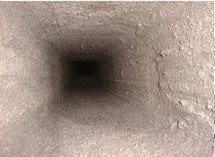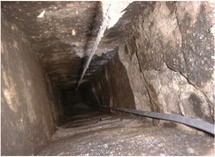Over time chimneys disintegrate. Most commonly the midfeather (the cement holding the bricks of your flue together) crumbles to the extent that gaps allow fumes and smoke to leak from one flue to another and enter into other rooms (typically a bedroom above the fireplace).
While disintegration is natural, the process is often accelerated by the presence of soot as the acid in the soot eats into the midfeather. Having your chimney and flue cleaned regularly can help to minimise the effects.
What is Eldfast Lining?
The Eldfast lining is a ceramic paste applied to the full length of the inside of your flue. It’s made of two elements; a refractory ceramic aggregate in powder form and a resin bonding agent. These are mixed together to create a slurry that sticks under pressure and is resistant to acid condensation damage, thus protecting your chimney and flue.

